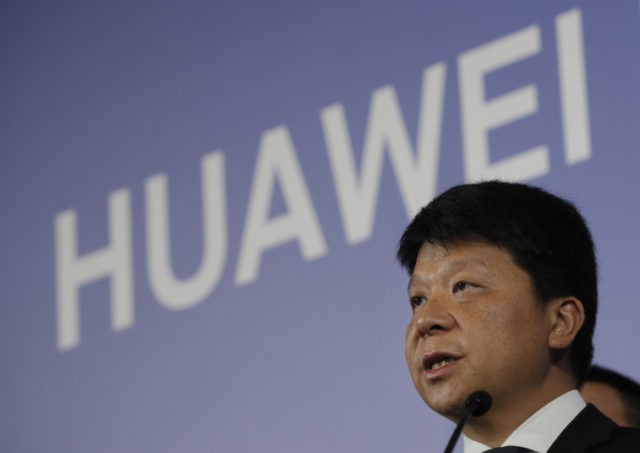China’s giant Huawei telecommunications company announced on Thursday it filed a lawsuit against the United States government over its ban on government agencies and contractors buying Huawei equipment. The ban was imposed over concerns that Huawei products may create security vulnerabilities that could be exploited by Chinese intelligence agents.
Huawei vigorously denies accusations that its products are compromised and present a security risk. Its lawsuit, filed in federal court in Texas, seeks to overturn a provision in current U.S. military funding legislation that forbids government agencies and their contractors from using Huawei products.
Huawei announced the lawsuit in a very aggressive press conference covered by the Associated Press:
“We are compelled to take this legal action as a proper and last resort,” the company’s rotating chairman, Guo Ping, said at a news conference. Guo said the ban would limit competition, slowing the rollout of fifth-generation communications and raising consumer prices.
Huawei has about 40 percent of the global market for network gear but its U.S. sales evaporated after a congressional panel in 2012 cited the company and a Chinese competitor, ZTE Corp., as security risks and told phone carriers to avoid dealing with them.
U.S. authorities “have hacked our servers and stolen our emails” but have presented no evidence to support their security claims, Guo said. He complaining Washington was “sparing no effort to smear” the company.
[…] The company is challenging the U.S. law as an unconstitutional “bill of attainder,” or a measure that targets a specific individual for penalties without a trial. The company says that infringes its due process rights and improperly has Congress play the role of a court.
The ban is “based on numerous false, unproven and untested propositions,” said Song Liuping, the company’s chief legal officer, at the news conference. “Huawei has an excellent security record and program.No contrary evidence has been offered.”
China accuses the U.S. government of fabricating security concerns about Huawei and other Chinese companies to hurt their business and give American firms an unfair competitive advantage. The U.S. is attempting to convince allies in Europe to avoid using Huawei equipment in their 5G wireless networks.
A Reuters analysis published on Thursday did not think much of Huawei’s chances in court, since federal courts generally try to avoid contradicting Congress and the executive branch on matters of national security, but speculated the Chinese company might be looking to “score public relations points against the U.S. government” by filing the suit. This would presumably improve China’s odds of convincing other countries to buy Chinese products and might be useful to China in resolving its trade war with the U.S.
“Huawei is showing that it will not roll over on the US full-court press,” Eurasia Group tech expert Paul Triolo told CNN on Thursday.
“It is not likely to result in Huawei gaining new access to the US market, but it is a symbolic marker that could influence other players around the world considering potential limitations or bans against the firm,” he predicted.
Huawei’s suit might also survive long enough to reach the discovery stage, at which point the company would be able to demand U.S. government documents it could search for evidence that the ban on its products is political in nature.
Reuters legal experts noted Russian software firm Kaspersky Lab filed a comparable “bill of attainder” challenge to the U.S. ban on its products in 2017, but the suit was rejected, in part because the federal government presented “ample evidence” that Kaspersky products presented a security risk. The Kaspersky suit was dismissed before it reached the discovery stage.
On the other hand, a Chinese-owned company called Ralls Corp successfully sued the Obama administration for blocking its attempt to build wind turbines near an Oregon military site. The ruling found the U.S. government did not give Ralls a reasonable opportunity to address allegations it posed a security risk.
The Australian Financial Review thought it was no coincidence that Huawei live-streamed a major press conference to roll out its lawsuit against the U.S. government at the same time the United States seeks to extradite Huawei Chief Financial Officer Meng Wanzhou from Canada to face charges of violating Iran sanctions. China also happens to have banned canola imports from Canada’s largest grain processor just days after the extradition hearings for Meng began.

COMMENTS
Please let us know if you're having issues with commenting.